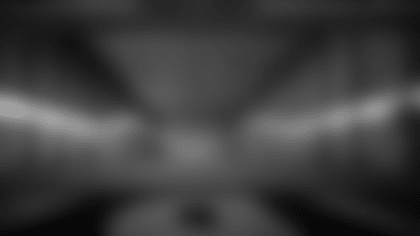On Carson Palmer's latitude in calling audibles: "Because of his experience and what he's shown to me in camp, he's given a lot of latitude. Most of what we do from the huddle, that's part of my background, has built-in outlets for hots. When we go to the no-huddle stuff we have a series of plays that we use. If we have that look we go to this call, if we have this look we go to that call. So there's that kind of audible, but it's built into the system."
On difficulty of calling audibles in Denver's environment: "Because of Carson's experience, I don't see it any more difficult than any other game. He's really proven to me that the way he manages it, not just in this last week but in training camp and during OTAs, he's got a real knack for it. It's something that's hard to teach as a coach, he does it naturally.
On calling audibles on the road: "He's done it so much though at other places on the road. He had to do it at Baltimore, which is obviously loud, and at Pittsburgh. His hand signals, along with the way he commands at the line of scrimmage and his voice, he does handle it very well."
On helping Coach Tarver with Peyton Manning's audibles: "Not a whole lot because each offensive scheme does it differently. Because Peyton's done it so much, he actually probably has triggers in that have quick counts and long counts for plays, so it's hard to get a rhythm to know what they're going to do."
On the cutoff: "From that perspective, we usually tell our guys that you have about eight seconds. If you don't have a call in by eight seconds, then you're going to be in trouble."
On going into no-huddle offense: "There's a pretty good list, it's more than two plays. We say, 'alright, if we get this look we like this call.' Sometimes it's as simple as if you have two safeties or one safety; sometimes it's based on personnel. Troy Polamalu, if he were to line up on this side we want to go this way, or we want to go at him if we want.
On if he's on the headset with Palmer: "I can go [on the headset] up to 15 seconds left [on the play clock]."
On calling plays: "What teams have gotten good at, though, is that they'll give you their look, and then change."
On similarity of Broncos defense last year with Coach Allen to this year: "There's a definite difference in that the coverages are different than what DA [Dennis Allen] did. DA probably had a little more man coverage where as Jack Del Rio has been a little more zone coverage. The front is the same though. You're going to see Von Miller and Elvis Dumervil coming off the edge quite a bit."
On Denver's personnel changes: "With their experience in the secondary, not only the [Tracy] Porter change, but the two safeties and their experience, they've been able to give multiple coverages. Whereas last year I don't think there were as many coverages being shown. They've given more looks from a secondary coverage standpoint."
On benefit of getting tight ends involved in the passing game: "It makes the defense have to cover, in my opinion, the width of the field along with the vertical part of the field. Having the ability, with what Brandon [Myers] has done inside the numbers, and create windows really puts stress on the linebacker so they can't get underneath the receivers as much, they've got to now be more careful with their drops, and be aware of the tight ends."
On what he knew about Brandon Myers when he arrived at the Raiders: "What I watched on tape last year reminded me of some guys in the past that I've had that maybe weren't elite status tight ends coming out of college as far as high-end draft picks and athletic ability. He had a knack to run routes and to create windows. With the play-pass that we do and some of the stuff that we ask for on third downs out of our tight ends that might have been different than what he had before here, he's been able to take advantage of those. Because that's what his strength is, his route running and creating windows for himself."
On adjusting for play without Darrius Heyward-Bey: "Hopefully he can play, but if not this will be the fourth week in a row with a different starting 11. Derek [Hagan] has really taken to the offense well. This week, in the last two days, we've had very good practices with those two young guys, but they're still young guys, and I hate to put a burden on a rookie receiver if we don't have to. You'll probably see a rotation of all four of them playing of some sort. I've been very impressed with Derek, how quickly he's learned the offense. Keep in mind the first week he was learning X, and then we moved him over to Z and he learned that well and when we went three-wide last week he had to play the Z and he did a fine job for us."
On comfort level having a veteran: "He'll be able to handle releases off press-coverages from Champ Bailey a little more than a rookie because he's handled that in the past with his experiences."
On Juron Criner's status: "Like Rod [Streater] has been, there's been some good weeks, and some learning weeks. They both have made progress and that's a pleasing sign to see. With Juron, it kind of set him back, that injury. A young guy can't afford to miss reps. With the injury he had he's fully recovered now from the [ankle]* *and he's made progress this week."
On Criner getting a catch to gain confidence: "It's a big confidence booster. Just like with Rod in the preseason, I think Criner got it in that third preseason game. It really does build confidence and a guy tends to play faster and a little more aggressive."
On Darren McFadden's long run last week causing relief: "No, that goes back to my original comment, it takes patience. It's part of the deal. Really, a lot of the credit for this game, for our success, should be to the defense for the two takeaways, and our return game was outstanding. We had a lot better field position to get going and they created a lot of great opportunities for us to have success. I was very pleased, I am happy for the players for them to get the experience of having some success with it."
On scoring on every possession of the second half: "It's one of those things you don't even realize until after the game because you're so engulfed into what's the next call to do and what's the next play to have the players make. It was very encouraging to see some consistency. That was an example and a sign for us that some of the guys are understanding it. They're getting a better understanding of the little things, the intricacies of the offense. Because we didn't have as many mistake here, mistake there, situations. It's hard to maintain that. It's very unusual to do that. From my experience it's maybe going to happen once, maybe twice a year that you have that kind of possession-scoring ratio. It'll be tough to do that up on the road as well as at home. We had the advantage of the fans, which was great support. It worked out well."
On if a close-game win is more important than a blow out: "It does, it builds a lot of confidence. What it's best for will be, hopefully down the line where you get closer to playoff time, you can recall that we had some close games, and we were behind, and we stuck in there and we hung in there and we found a way to win it. If you can get two or three of those early in the season and bank them, it can come back to help you down the line, no doubt, for confidence, for belief."
On the type of challenges for Willie Smith this week: "Very good one. Either side you look at it, with both of those pass rushers, they're elite pass-rushers. Both him and Jared will have a real challenge because those two guys aren't the tallest guys rushing off the edge, but they're some of the quickest, and some of the best leverage rushers I've seen. It's going to be very important to see that their technique is sound so they can stay in front of those guys in pass-protection.
On if they flop them: "Yeah, they'll play both sides."

























